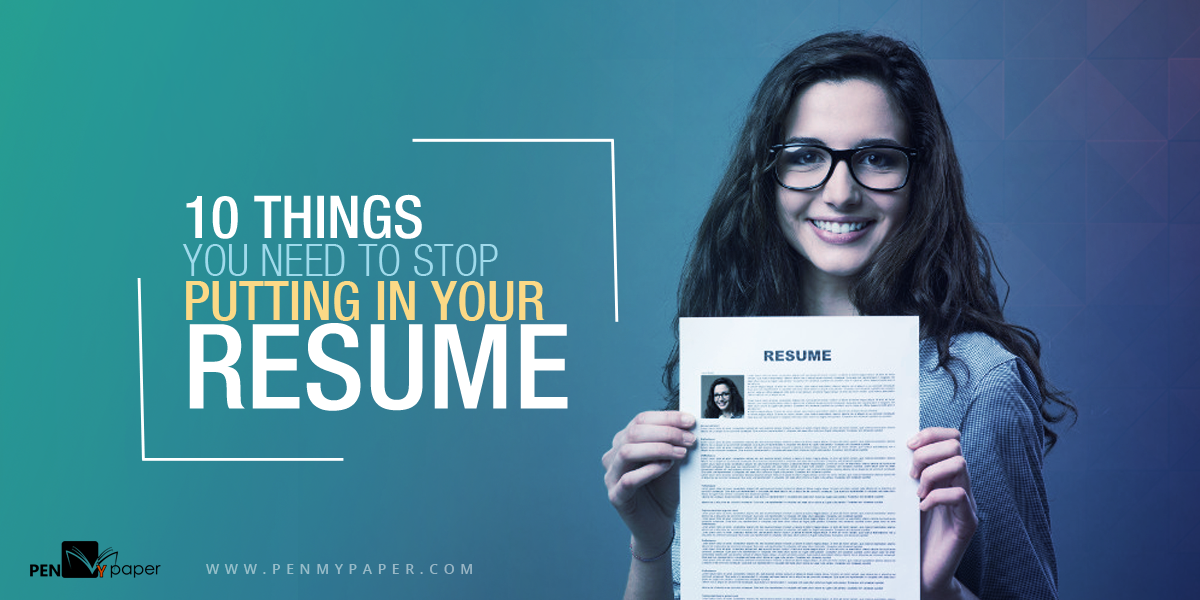10 Things You Need to STOP Putting in Your Resume

If a successful career is a bird sitting on a branch, a resume or a Curriculum Vitae is the spear you need to take it down.
A good resume is the most needed thing in order to succeed in the corporate sector of modern times. Of course, having a good education, a good job experience, and a platter of required job skills are required – but how do you tell the employer about all these? Our research paper writer in this context says that you should write those down in a systematic and professional manner; that is what you call a resume or a Curriculum Vitae (although there are a few technical differences between a resume and a curriculum vitae).
So how do you write a good resume? We’re not going to tell you what you should put in your resume; there will be a lot of sources and eBooks where you can look for what to put in a resume. We’re here to tell you what you should avoid at all costs while writing your resume.
Well, writing a resume not at all requires creative writing skills. All it requires are some hacks and concentration. If the internet is to be believed, there are over a couple of dozen mistakes that people do in their resumes. But we’re elaborating on 10 most common mistakes that people do in their resumes, and why you should keep them at another bay while you write your resume so that you can have a successful career.
1. Irrelevant Job Experiences: Cut these out completely; if you add job experiences that are not even remotely related to the one that you are applying for, you are just telling the HR that you are an amateur, not a professional. A law firm doesn’t need to know that you worked in a pet shop. Or a swim instructor doesn’t require to display their prior experience as a marketing essay helper.
2. Objective: This is the single most clichéd thing about a resume and makes it, well, not what you wanted to portray, at all. There are no points in guessing that you need a job, you don’t need to write that down. This is sometimes a job repellent. You can seek professional assistance, in case, you are not clear about the objective which is the center of attraction in your resume, or need help to write essay.
3. Irrelevant Hobbies: If you do not want to tick off the recruiters, you need to stop putting ‘gardening’ as a hobby unless you’re applying for the role of a farm boy. You will just be wasting time and paper, and oh – another job opportunity.
4. References: Remember how you cited your essays in college? If not buy research papers from a reliable platform and watch how references from authentic sources play an important role. Not saying that all references are harmful, but it’s best if you leave your resume sans references. It adds weight to your profile and personality. Let the recruiter ask you for the references; that is a better professional way.
5. Pronouns: Putting these in a resume is a sin – you should never in your worst nightmares make the mistake of using a pronoun in your resume. A resume is not something that is supposed to be interactive – it’s all about the facts. To be more precise, relevant facts about your achievements, education, and professional experiences should do the trick.
6. Funky Fonts: You need to remember that you are not in high school anymore; you are not applying for membership in a drama club. Be professional and use the fonts that portray that you are a professional. Use Times New Roman, Calibri, or Ariel Rounded MT Bold. Keep Comic Sans MS and Forte for your party invitations. Also, make sure that there are not any grammatical errors.
7. Jobs That Didn’t End Well: All’s well that ends well, right? But since those jobs didn’t end well, you need not put them in your resume. Whether it was your fault or the previous employer’s, your potential employer will take it as your fault. Even if they are decent enough to listen out your side of the story, where is the relevance? The best tip here is to do a swot analysis of yourself and your career, and mention only the ones that channel immense value. Just avoid adding previous relations that went sour.
8. Your Picture: This can be your grave in a corporate interview. Adding your picture to your resume is the single most immature thing you can do. The person that will be handing out your resume to the recruiters will be YOU – so where is the point of adding a picture? Remove your picture immediately from your resume if you have it there.
9. Opinions: We know opinions can be biased; facts, however, cannot. Include only facts in your resume. Do not leave any space for any kind of speculations in your resume. Make it very clear; let the recruiters make an instant impression.
10. Personal Details: This is for the last – refrain from including your social media links, blog links (unless it is relevant), marital status, social number, address etc. in your resume. These will be completely unnecessary.
Writing a good resume is not rocket science. It actually follows really simple study hacks if you know the basic necessities of the resume, which is to let your recruiter know about you in a brief professional manner. To get an idea of which details to insert and learn how to be more expressive, just ask for a reflective essay from our professional team.

